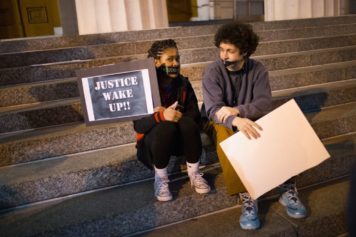
A protester shouts as she moves away from a line of riot police in Ferguson, Mo. on Wednesday, Aug. 13, 2014. (AP Photo/St. Louis Post-Dispatch, J.B. Forbes)
The good news is that the Ferguson, Missouri city council approved sweeping changes to its court system and police department, in line with a consent decree the city negotiated with the U.S. Department of Justice. The bad news, depending on how you look at it, is that the city council decided to make some changes over cost concerns.
If the two sides — the city of Ferguson and the Justice Department — fail to see eye-to-eye on this agreement, the feds could take the municipality to court, as NPR reported.
Among the changes to the DOJ agreement the city council seeks are eliminating the mandate leading to an increase in police officer pay, and provisions on staffing levels at the city jail, according to USA Today. In addition, the city council wants to change deadlines reached in the decree, and cap federal monitoring fees paid by Ferguson at $1 million.
Supporters of the consent decree contend that it is needed to bring justice and equity to the Black residents of Ferguson. Opponents point to the price tag that would be imposed, for fear Ferguson would cease to exist, though they did not voice similar concerns regarding the cost of teargas and military hardware the police used to terrorize African-Americans. Nor were there concerns about the cost of the bullets that killed Michael Brown, the billy clubs used to brutalize Black people on a regular basis, or the price of paying city employees to violate the constitutional rights of poor citizens. Suddenly, a city that profited off the backs of Black people is concerned about cost.
While the city has an annual budget of $14.5 million and is $2.8 million in debt, it is estimated the plan will take $2.2 million to $3.7 million to implement in the first year, and $1.8 million to $3 million in the second and third years. However, court litigation could cost the city far more.
In response, the Justice Department expressed its disappointment. Vanita Gupta, Principal Deputy Assistant Attorney General and head of the Justice Department’s Civil Rights Division, said the following in a statement, which does not sound encouraging for Ferguson city officials:
The Ferguson City Council has attempted to unilaterally amend the negotiated agreement. Their vote to do so creates an unnecessary delay in the essential work to bring constitutional policing to the city, and marks an unfortunate outcome for concerned community members and Ferguson police officers. Both parties engaged in thoughtful negotiations over many months to create an agreement with cost-effective remedies that would ensure Ferguson brings policing and court practices in line with the Constitution. The agreement already negotiated by the department and the city will provide Ferguson residents a police department and municipal court that fully respects civil rights and operates free from racial discrimination.
The Department of Justice will take the necessary legal actions to ensure that Ferguson’s policing and court practices comply with the Constitution and relevant federal laws.
The NAACP Legal Defense and Educational Fund rejected the argument that the agreement will be too expensive to implement, and argued that civil rights are never too costly to enforce or protect.
“Local and state actors have used claims of insufficient funding to try to elude legal mandates since time immemorial, including desegregation in the South, eliminating bias in hiring and training, improving prison conditions, and countless other civil rights advancements,” said LDF’s President and Director-Counsel Sherrilyn Ifill. “We reject this argument out of hand as an affront to democracy. All public institutions, including police departments, must operate in accordance with the U.S. Constitution. The Ferguson City Council must approve the proposed consent decree and work diligently and immediately to acquire the necessary funds to protect the lives and civil rights of all its residents, regardless of race.”
The proposed consent decree, of which a draft was released late last month, requires the appointment of an independent monitor. The 127-page agreement revamps the Ferguson court system, and sets guidelines on police policies and practices, such as requiring body cameras and emphasizing restraint and de-escalation rather than the use of force. The agreement was designed to ensure protection of the community’s constitutional and other legal rights, improve Ferguson’s ability to fight crime, increase officer and public safety, and increase public confidence in the Ferguson police.

